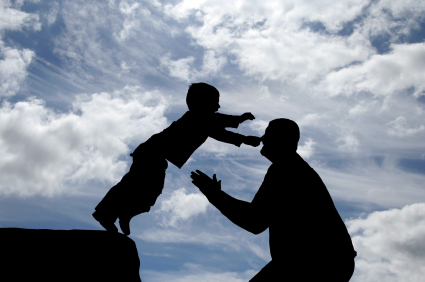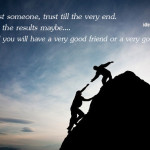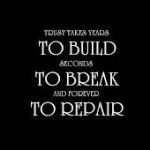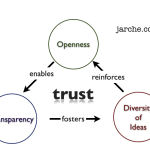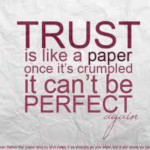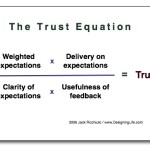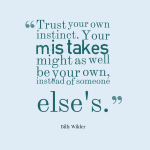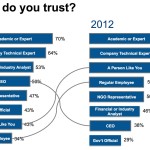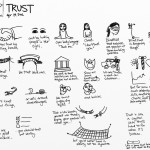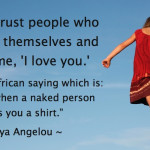Recently a pastor in Northern Ireland chose to use his sermon to castigate Muslims as “heathen” and “satanic” – but did conclude that he would “trust them to go to the shops” for him. Obviously a major concession that they would not run off with the money, though indicative of the mutual mistrust, if not active distrust prevalent between religious groups. If, as claimed, the chap in question “abhors violence” then surely the correct course of action world be to engender more trust by organising a joint Christian-Muslim meet and greet day, where they could discuss their differences and learn to co-operate more closely for mutual good? Surely trust and close co-operation is more desirable than antipathy and incitement to hatred? Starting from the position that “I’m right and you’re wrong” is not conducive to trust.
Ah, but trust is such a slippery, elusive quality. Take the Wikipedia discussion on the definition of the concept:
In a social context, trust has several connotations. Definitions of trust typically refer to a situation characterised by the following aspects: One party (trustor) is willing to rely on the actions of another party (trustee); the situation is directed to the future. In addition, the trustor (voluntarily or forcedly) abandons control over the actions performed by the trustee. As a consequence, the trustor is uncertain about the outcome of the other’s actions; they can only develop and evaluate expectations. The uncertainty involves the risk of failure or harm to the trustor if the trustee will not behave as desired.
Trust can be attributed to relationships between people. It can be demonstrated that humans have a natural disposition to trust and to judge trustworthiness that can be traced to the neurobiological structure and activity of a human brain. Some studies indicate that trust can be altered e.g. by the application of oxytocin. Conceptually, trust is also attributable to relationships within and between social groups (families, friends, communities, organisations, companies, nations etc.) It is a popular approach to frame the dynamics of inter-group and intra-group interactions in terms of trust.
When it comes to the relationship between people and technology, the attribution of trust is a matter of dispute. The intentional stance demonstrates that trust can be validly attributed to human relationships with complex technologies. However, rational reflection leads to the rejection of an ability to trust technological artefacts.
The thing about trust is that must be earned over a long period by actions and words alike, one that can vanish forever once broken, evaporating into the mists as if it had never been there in the first place. You can try to recover the situation but once the bond of mutual trust has been broken things can never be quite the same, no matter what the circumstances. A lingering residue of suspicion and reserve will always remain.
Some people are instinctively trusting and will give others the benefit of any doubt for as long as possible, but there is no turning back once trust has been betrayed. Maybe time was that some could live by their own wits and trust nobody but themselves, but in an increasingly interconnected world you have to trust others or you simply can’t achieve anything. Order an item online and you trust that the company will deliver rather than keeping your money and doing nothing – which is why most of us place high reliance on dealing with reputable companies, those we feel or know by experience will not let us down, those worthy of trust.
We trust colleagues at work, particularly direct reports, to do as we ask, or if they can’t then to tell us why in advance of a deadline. But when they fail this does not negate the value of delegation or placing trust by empowering people – though you could be forgiven for thinking that by watching some of the control freakery that goes on in large organisations, which might be summarised in the old Yorkshire saying: “if you want owt doing, do it thi’sen.” Actually, your rewards will be far greater from building and nurturing a team who can be trusted not only to work diligently but also to take decisions you would endorse and support, even when you are not there to take them in person.
It’s not about whether the people concerned are trustworthy but whether you are willing and able to let go and let them do the job, and measure whether they do it to the standard you want and expect. Maybe also a fear they might do a job better than you would – which in itself is a good thing for the team and the task required, though there is nothing some people enjoy better than the schadenfreude of seeing someone fail and come to grief – which is also the antithesis of supported trust, the type where you offer encouragement and mentor someone to succeed by virtue of your faith in their ability.
Trust starts from a position of exposure, making yourself open and vulnerable, not holding back anything relevant. Any suspicion you are holding back will then prompt a further question: what else are you hiding? Whatever the context, this vulnerability is always the most difficult part to achieve, since we have all been hurt somewhere along the way and want nothing more than to avoid pain. Risking a repeat takes reserves of courage that some will never possess – but if it’s a relationship we’re talking about you might as well have a heart made of granite. The benefits of mutual trust far outweigh the risk taken to get there.
So who do you trust? Unless you’ve had experience to the contrary you will generally trust your parents, and if you’re in a stable relationship you should trust your partner. You hope to trust your children, though on various occasions they will defy your trust and go their own way – which is an integral part of growing up. You may or may not trust an employer, though increasingly people don’t since promises made can be reversed as soon as circumstances demand change.
Working in the NHS illustrates to perfection the thin line between trust and distrust, since most people would instinctively trust their doctor, regardless of what he told them and how uncertain (s)he might be about a diagnosis or treatment. However, NHS management is the object of opprobrium from a great number of people, usually based on myth and inaccurate gossip, assuming that it exists in endless layers of hierarchy solely to deny people treatment, close beds and be incompetent at every level. Trust has to be based on fair and accurate information, and distrust based on misinformed perceptions can be devastating. To gain trust requires some level of research to find the reality first.
But who trusts politicians, other than to do what suits them? Almost nobody, and politicians have only themselves to blame for that situation. Some celebs get higher ratings in polls, but they often have ways to hide misdemeanours and truths from their public, such that many would be untrustworthy in the extreme. Maybe there are times when we are happy to believe lies and for our trust to be betrayed. Belief in fairy tales is arguably the core of religious faith, so self-deception is an element of very many lives. Is that better than permanent scepticism or even cynicism? I’d say so.
Who in public life is trustworthy? Look at the survey pictured above and you’ll see academics and experts get the highest ratings, and rightly so. It’s not that they are incapable of misleading or providing flawed evidence, but they have no axe to grind and are therefore more likely to tell you an accurate story without embellishing the truth or promoting lies. For me trust in a genuine professional opinion is the height of reliability – providing that opinion is not being funded by someone with an ulterior motive and who wants evidence solely to support their point of view, for example.
But beware. Remember the pitfalls of being too trusting in what you are told (naive and gullible) or not trusting enough (cynical), which means there is a happy medium in which most of us hover most of the time, sure in the knowledge that on occasions we will invest emotional energy in trusting someone or something that betrays us, or on others in failing to trust someone who it later transpired was the genuine article. If we could get it right all the time, we might have cracked the secret of successful living.

